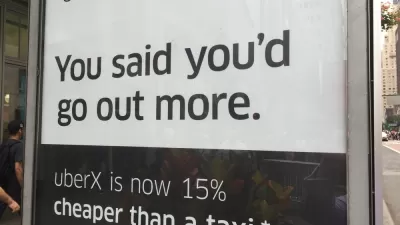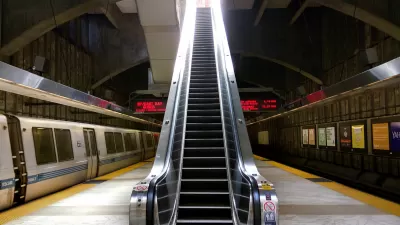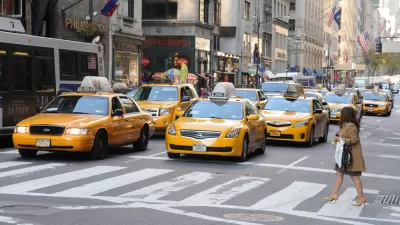Ride-hailing companies have yet to deliver on many of the transportation system improvements that they, and their supporters, have been promising. Streetsblog USA provides a scathing critique of the consequences of widespread ride-hailing.

Angie Schmitt follows a recent "raft" of studies finding negative effects from the widespread adoption of ride-hailing services like Uber and Lyft—the most recent being the news that UCLA students are hailing rides 11,000 times a week just to get around campus.
"It’s becoming more and more clear that Uber and Lyft having some pretty pernicious effects on public health and the environment, especially in some of the country’s largest cities," according to Schmitt.
To better keep track of the kinds of bad news that have been made public regarding ride-hailing companies in recent months, Schmitt offers the following list, with a lot more detail included in the source article:
- They increase driving, a lot.
- They are inefficient (lots of "deadheading" or driving time with no passengers).
- They operate in largest numbers in transit-rich cities and neighborhoods.
- They replace alternative transportation (e.g., walking, biking, transit).
- They hurt transit ridership.
- They reduce political support for public transit.
- They increase traffic fatalities.
- They hoard data.
FULL STORY: All the Bad Things About Uber and Lyft In One Simple List

Planetizen Federal Action Tracker
A weekly monitor of how Trump’s orders and actions are impacting planners and planning in America.

San Francisco's School District Spent $105M To Build Affordable Housing for Teachers — And That's Just the Beginning
SFUSD joins a growing list of school districts using their land holdings to address housing affordability challenges faced by their own employees.

The Tiny, Adorable $7,000 Car Turning Japan Onto EVs
The single seat Mibot charges from a regular plug as quickly as an iPad, and is about half the price of an average EV.

Seattle's Plan for Adopting Driverless Cars
Equity, safety, accessibility and affordability are front of mind as the city prepares for robotaxis and other autonomous vehicles.

As Trump Phases Out FEMA, Is It Time to Flee the Floodplains?
With less federal funding available for disaster relief efforts, the need to relocate at-risk communities is more urgent than ever.

With Protected Lanes, 460% More People Commute by Bike
For those needing more ammo, more data proving what we already knew is here.
Urban Design for Planners 1: Software Tools
This six-course series explores essential urban design concepts using open source software and equips planners with the tools they need to participate fully in the urban design process.
Planning for Universal Design
Learn the tools for implementing Universal Design in planning regulations.
Smith Gee Studio
City of Charlotte
City of Camden Redevelopment Agency
City of Astoria
Transportation Research & Education Center (TREC) at Portland State University
US High Speed Rail Association
City of Camden Redevelopment Agency
Municipality of Princeton (NJ)





























